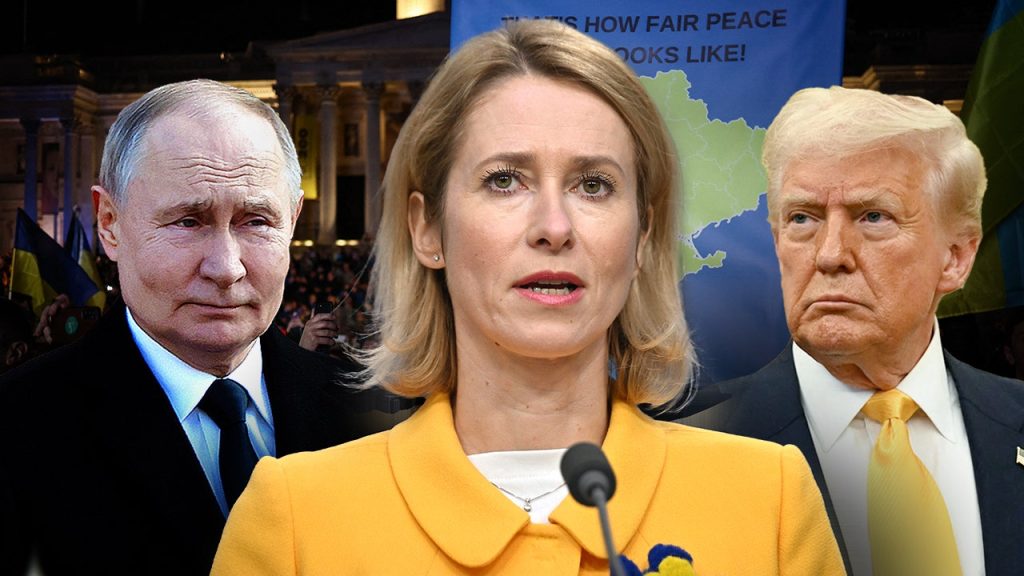In a recent interview, Chief European Union diplomat Kaja Kallas addressed comments made by former President Donald Trump, who claimed that the European Union was created to undermine the United States. Kallas asserted that the EU is fundamentally a peace project aimed at fostering cooperation among member states. She emphasized the importance of supporting Ukraine in its conflict with Russia, arguing that this struggle is not only about Ukrainian sovereignty but also about global freedom and adherence to international law.
| Article Subheadings |
|---|
| 1) Kallas Disputes Trump’s Assertion on the EU |
| 2) Historical Context: EU’s Role in Promoting Peace |
| 3) Ukraine’s Struggle: A Broader Fight for Freedom |
| 4) The Economic Leverage Against Russia |
| 5) Concluding Remarks by Kallas |
Kallas Disputes Trump’s Assertion on the EU
During an interview on CBS News’ “Face the Nation,” Kaja Kallas reacted to Donald Trump’s provocative claim asserting that the European Union was created to exploit the U.S. Kallas, who serves as the EU’s High Representative for Foreign Affairs and Security Policy, emphasized that the foundation of the EU was built on the principles of peace and collaboration. She highlighted that the organization was established to prevent conflict among European nations, which has largely succeeded since its inception. Kallas expressed her surprise at Trump’s statement while recalling how, two decades ago, the U.S. encouraged her home country, Estonia, to join the EU as a way to strengthen transatlantic relations.
Historical Context: EU’s Role in Promoting Peace
The European Union was formed in the aftermath of World War II, with the primary goal of ensuring lasting peace in Europe through economic and political integration. The idea was that economic interdependence would reduce the likelihood of wars between member states, a philosophy that Kallas defended robustly. She provided an articulate argument underscoring the necessity of unity within Europe and the significance of the EU in averting conflicts. “Europe is a peace project,” Kallas stated, emphasizing that the EU was established precisely to prevent wars among its members. To date, the EU’s track record of maintaining peace, especially in a region that experienced devastating conflicts earlier in the last century, is noteworthy.
Ukraine’s Struggle: A Broader Fight for Freedom
Kallas also voiced strong support for Ukraine amid its ongoing conflict with Russia, framing the battle as one that directly impacts global freedoms. The EU diplomat highlighted the efforts being undertaken to coordinate support for Ukraine, working closely with leaders such as French President Emanuel Macron and British Prime Minister Keir Starmer. Through the lens of democracy and international law, she underscored the gravity of Ukraine’s current situation, stating, “The fight that Ukraine is having is not only about Ukraine’s sovereignty; it’s about freedom of the free world.” In doing so, Kallas articulated her belief that a failure to support Ukraine could lead to broader geopolitical consequences.
The Economic Leverage Against Russia
One of the pivotal points Kallas made was regarding the economic pressure that both the U.S. and Europe could exert on Russia to halt its aggressive actions in Ukraine. With attention to Russia’s economic conditions, she noted that the country’s inflation rates are soaring and its National Fund is severely depleted. Kallas argued against the notion that Russia’s power should be overestimated, recommending that Europe and its allies maintain a united front to apply diplomatic and economic pressure on Russia. Her remarks highlighted the necessity of not underestimating the collective strength of European and American economies in confronting Russia’s military aggression.
Concluding Remarks by Kallas
In the wake of Trump’s comments and the ongoing conflict in Ukraine, Kallas’s statements serve to reinforce the EU’s commitment to peace and cooperation among nations. Her observations reflect not only her dedication to the objectives of the European Union but also assert the responsibility of global leaders to address geopolitical threats in a unified manner. As discussions around the EU’s role and effectiveness continue to unfold, her insights provide essential perspective on the importance of collaborative efforts in maintaining international stability and supporting democratic values across the globe.
| No. | Key Points |
|---|---|
| 1 | Kaja Kallas disputes Trump’s assertion that the EU undermines the U.S. |
| 2 | The EU was established to ensure lasting peace in Europe post-World War II. |
| 3 | Kallas emphasizes that Ukraine’s struggle is vital for global freedom. |
| 4 | The United States and Europe can use economic pressure to mitigate Russia’s actions. |
| 5 | Kallas asserts the importance of unity among global leaders in addressing threats. |
Summary
The remarks from Kaja Kallas reinforce the notion that the EU continues to play a crucial role in fostering democracy and peace in Europe while advocating for global freedoms. As geopolitical tensions rise with Russia’s actions in Ukraine, her insights stress the importance of collaboration between the EU and the U.S. in confronting threats to international law and stability. Kallas’s emphasis on leveraging economic power showcases a strategic approach to diplomacy, centering around unity and partnership among democratic nations.
Frequently Asked Questions
Question: What is the primary purpose of the European Union?
The European Union was established to promote peace, security, and economic collaboration among its member states, ensuring stability and preventing conflicts in Europe.
Question: Why is the support for Ukraine considered significant by Kallas?
Kallas believes that supporting Ukraine goes beyond national sovereignty; it represents a fight for the principles of freedom, democracy, and the enforcement of international law globally.
Question: How can economic pressure impact Russia’s actions in Ukraine?
Economic pressure through sanctions and diplomatic measures can strain Russia’s economy, limiting its ability to sustain military operations, which could lead to a cessation of hostilities in Ukraine.


